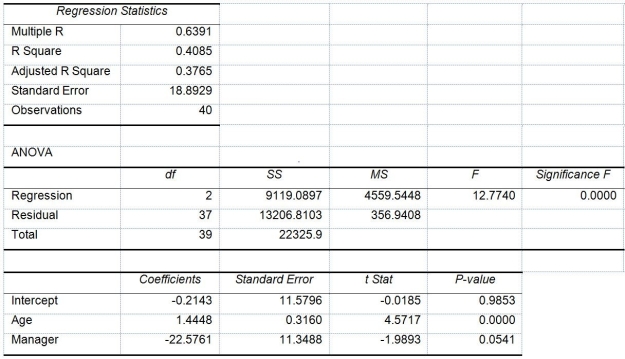TABLE 14-17
Given below are results from the regression analysis where the dependent variable is the number of weeks a worker is unemployed due to a layoff (Unemploy)and the independent variables are the age of the worker (Age)and a dummy variable for management position (Manager: 1 = yes,0 = no).
The results of the regression analysis are given below: 
-True or False: Referring to Table 14-17,the null hypothesis H0 : β1 = β2 = 0 implies that the number of weeks a worker is unemployed due to a layoff is not affected by some of the explanatory variables.
Definitions:
Communication Deficits
Refers to challenges in effectively conveying or receiving messages verbally, non-verbally, or through written form, hindering interpersonal and social interactions.
Restrictive Repetitive Behaviors
Actions or routines that are performed over and over, which can significantly interfere with daily functioning, commonly seen in autism spectrum disorders.
Lifespan Consideration
The assessment of individual needs and adjustments required at different stages of life.
Intellectual Abilities
The capacity to think logically, reason abstractly, understand complex ideas, and solve problems.
Q13: True or False: A simple price index
Q28: The Y-intercept (b<sub>0</sub>)represents the<br>A)estimated average Y when
Q49: The C<sub>p</sub> statistic is used<br>A)to determine if
Q65: True or False: Referring to Table 15-1,a
Q124: Referring to Table 12-6,what are the degrees
Q191: Referring to Table 14-17,what are the numerator
Q201: Referring to Table 13-4,the managers of the
Q239: Referring to Table 14-11,which of the following
Q273: Referring to Table 14-17,what are the lower
Q305: Referring to Table 14-7,the department head wants